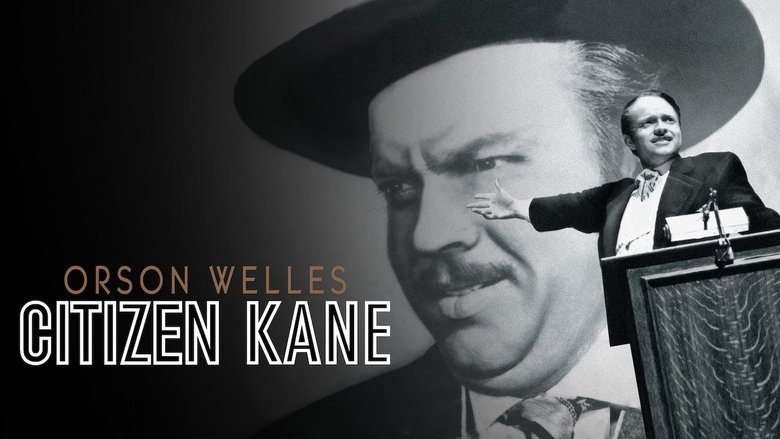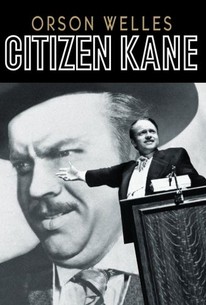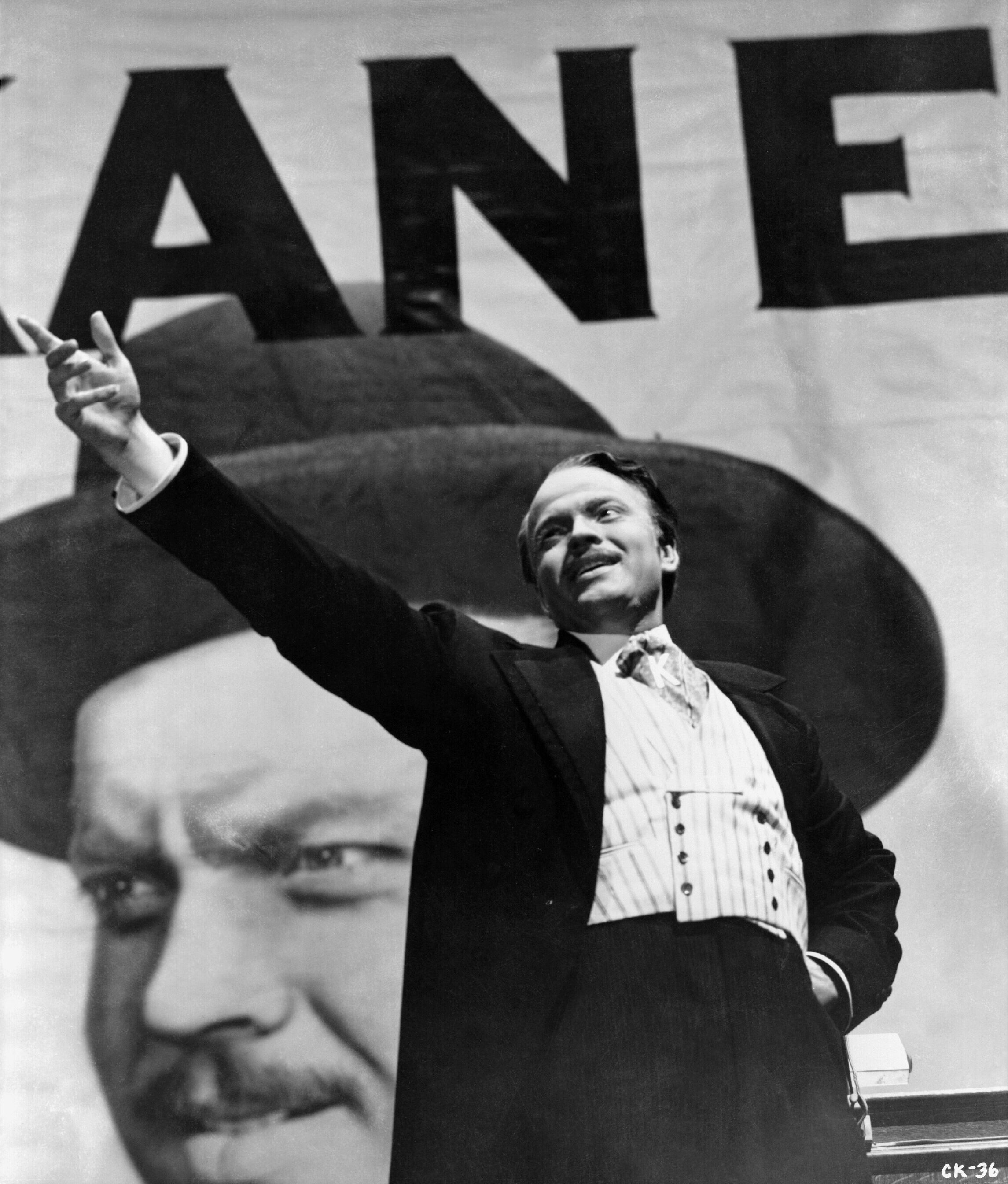← Back to Reviews

in
Citizen Kane
It's considered a landmark in the art of film making and by many cinephiles the greatest film ever made. If he had done nothing else in his distinguished career, Orson Welles carved a place in movie history with the 1941 classic Citizen Kane, a dark and stylish look at a media mogul, based a real life figure, that still impresses as a master class in the art of film making that received nine Oscar nominations, but for this reviewer, the film didn't quite live up to its reputation.

The film opens with an authentic looking newsreel centered on the death of one Charles Foster Kane, an enigmatic and newspaper publisher and politician, which has moved several members of the media to find out who the real Charles Kane was. Research and visits to his estate provide little insight into what made Kane tick, but an investigation is instigated into his life prompted by the reveal of the last word Kane uttered before his death..."rosebud."

Welles' passion and artistry as a filmmaker is everywhere here. He is presenting a very specific portrait of a person, based on a real life figure, which is probably why the film caused the controversy that it did. As most people know, the character of Charles Foster Kane was based on William Randolph Hearst, who was actually still alive and well at the time this film was made. As the saying goes, names were changed to protect the innocent, but the story could only be disguised so much. Apparently, the thin disguise was a little too thin as Hearst forbid the film to be advertised in any of his newspapers and attempted to buy the film from RKO with the intent of destroying it.
[IMG]https://miro.medium.com/max/600/1*J6z_OGboQti4-oKSxzVZGQ.jpeg[/IMG]
The Oscar-winning screenplay by Welles and Herman J. Manckiewicz is effective in its general structure but a little sketchy in some details. The film begin with a brief look into Kane's troubled childhood where a financial arrangement is arranged for his upbringing and then immediately flashes forward to him buying and taking over the New York National Inquirer. it's never really made clear how that initial contract with his mother (beautifully played by Agnes Moorehead) turned into millions. I did enjoy that scene at the Inquirer where he smells a story where the current editor doesn't and demands that he pursue it, even if it means threatening the victim. Unfortunately as the story progresses, it is overpowered by elements of melodrama that dilute the power of the story.

It's the presentation of this character, Charles Foster Kane, that makes this film so riveting. We are fascinated watching his pursuit of power, even though power seems to be the last thing on his mind. The man is not above using his money to get what he wants while simultaneously feigning disdain for the almighty dollar. Kane's love of power over money comes through when he throws his hat in the political arena...this is the only time in the story where he really seems to enjoy what he's doing and is most destroyed when it comes to an end. It was pretty gutsy of Welles presenting a fictionalized version of a real person in such an unflattering light.

The real star of this film is Orson Welles the director. The style and imagination that Welles puts into the visual presentation of this story can't be denied. It was so interesting the way a lot of the film was shot in shadows, giving it almost a supernatural feel. The sweeping camera work over Kane's empire seems to imply that Kane might be more powerful than a mere earthling, or might just be a figment of the viewer's imagination. The film features incredible Oscar-nominated cinematography, set direction, and film editing. The film was actually edited by future Oscar winning director Robert Wise. It gets a little too melodramatic in spots, which slows the film down, but this piece of cinema is still worth experiencing, almost 80 years later.
It's considered a landmark in the art of film making and by many cinephiles the greatest film ever made. If he had done nothing else in his distinguished career, Orson Welles carved a place in movie history with the 1941 classic Citizen Kane, a dark and stylish look at a media mogul, based a real life figure, that still impresses as a master class in the art of film making that received nine Oscar nominations, but for this reviewer, the film didn't quite live up to its reputation.
The film opens with an authentic looking newsreel centered on the death of one Charles Foster Kane, an enigmatic and newspaper publisher and politician, which has moved several members of the media to find out who the real Charles Kane was. Research and visits to his estate provide little insight into what made Kane tick, but an investigation is instigated into his life prompted by the reveal of the last word Kane uttered before his death..."rosebud."

Welles' passion and artistry as a filmmaker is everywhere here. He is presenting a very specific portrait of a person, based on a real life figure, which is probably why the film caused the controversy that it did. As most people know, the character of Charles Foster Kane was based on William Randolph Hearst, who was actually still alive and well at the time this film was made. As the saying goes, names were changed to protect the innocent, but the story could only be disguised so much. Apparently, the thin disguise was a little too thin as Hearst forbid the film to be advertised in any of his newspapers and attempted to buy the film from RKO with the intent of destroying it.
[IMG]https://miro.medium.com/max/600/1*J6z_OGboQti4-oKSxzVZGQ.jpeg[/IMG]
The Oscar-winning screenplay by Welles and Herman J. Manckiewicz is effective in its general structure but a little sketchy in some details. The film begin with a brief look into Kane's troubled childhood where a financial arrangement is arranged for his upbringing and then immediately flashes forward to him buying and taking over the New York National Inquirer. it's never really made clear how that initial contract with his mother (beautifully played by Agnes Moorehead) turned into millions. I did enjoy that scene at the Inquirer where he smells a story where the current editor doesn't and demands that he pursue it, even if it means threatening the victim. Unfortunately as the story progresses, it is overpowered by elements of melodrama that dilute the power of the story.

It's the presentation of this character, Charles Foster Kane, that makes this film so riveting. We are fascinated watching his pursuit of power, even though power seems to be the last thing on his mind. The man is not above using his money to get what he wants while simultaneously feigning disdain for the almighty dollar. Kane's love of power over money comes through when he throws his hat in the political arena...this is the only time in the story where he really seems to enjoy what he's doing and is most destroyed when it comes to an end. It was pretty gutsy of Welles presenting a fictionalized version of a real person in such an unflattering light.

The real star of this film is Orson Welles the director. The style and imagination that Welles puts into the visual presentation of this story can't be denied. It was so interesting the way a lot of the film was shot in shadows, giving it almost a supernatural feel. The sweeping camera work over Kane's empire seems to imply that Kane might be more powerful than a mere earthling, or might just be a figment of the viewer's imagination. The film features incredible Oscar-nominated cinematography, set direction, and film editing. The film was actually edited by future Oscar winning director Robert Wise. It gets a little too melodramatic in spots, which slows the film down, but this piece of cinema is still worth experiencing, almost 80 years later.
